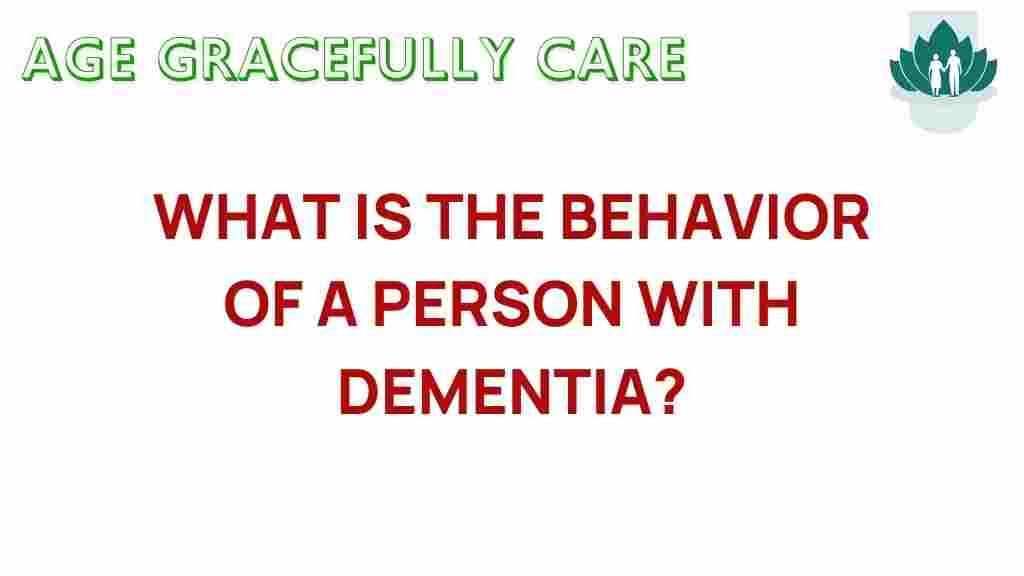Unveiling the Complex Behavior of Individuals with Dementia Behavior
Dementia is a progressive neurological disorder that affects millions of individuals worldwide. As cognitive decline progresses, understanding dementia behavior becomes increasingly crucial for caregivers and loved ones. This article aims to shed light on the complex behaviors exhibited by individuals with dementia, exploring the underlying causes, emotional changes, and practical caregiving strategies. By enhancing our understanding of dementia, we can improve patient care and foster better communication with those affected.
Understanding Dementia and Its Impact
Dementia encompasses a wide range of symptoms and behaviors associated with cognitive decline, often leading to significant memory loss and changes in emotional responses. It is not a single disease but rather a term that describes a group of symptoms affecting memory, thinking, and social abilities. Some common forms of dementia include:
- Alzheimer’s Disease
- Vascular Dementia
- Lewy Body Dementia
- Frontotemporal Dementia
Individuals with dementia experience a variety of cognitive and emotional changes that can manifest in different behaviors. Understanding these behaviors is essential for effective caregiving and improving the quality of life for those affected.
Common Dementia Behaviors and Their Causes
As dementia progresses, individuals may exhibit various behaviors that can be perplexing and challenging for caregivers. Recognizing these behaviors and their potential causes is vital for effective patient care. Some common dementia behaviors include:
- Memory Loss: Individuals may struggle to remember names, faces, or recent events.
- Confusion: They may become disoriented in familiar places or have difficulty following conversations.
- Aggression or Agitation: Sudden mood swings can lead to irritability, frustration, or even aggression.
- Repetition: Asking the same questions or telling the same stories multiple times due to memory issues.
- Withdrawal: A tendency to isolate themselves from social interactions and activities.
Understanding the reasons behind these behaviors can help caregivers respond appropriately. For instance, memory loss may lead to confusion, causing agitation when individuals cannot find familiar items or understand their surroundings.
Emotional Changes in Individuals with Dementia
Alongside cognitive changes, emotional alterations are also prevalent among individuals dealing with dementia. These can include:
- Depression: Feelings of sadness or hopelessness may arise as individuals grapple with their cognitive decline.
- Anxiety: Uncertainty about their condition and future can result in increased anxiety levels.
- Frustration: Difficulty performing daily tasks can lead to frustration and a sense of loss of independence.
Recognizing these emotional changes is critical for caregivers, as they can provide essential context for behavioral expressions. For example, an individual who is agitated may be experiencing anxiety or frustration rather than outright anger.
Effective Communication Strategies for Caregivers
Communication is key when caring for individuals with dementia. Here are some strategies that can enhance understanding and connection:
- Use Simple Language: Speak clearly and use short, simple sentences to convey information.
- Maintain Eye Contact: Engage with the individual by making eye contact, which can help in establishing a connection.
- Be Patient: Allow time for the individual to process information and respond. Rushing can lead to confusion.
- Non-Verbal Cues: Use gestures, facial expressions, and body language to support verbal communication.
- Stay Calm: Your emotional state can influence theirs; remaining calm can help reduce anxiety.
Effective communication fosters a supportive environment that can significantly enhance the overall experience for both the caregiver and the individual with dementia.
Step-by-Step Process for Managing Dementia Behavior
Managing dementia behavior requires a structured approach. Here’s a step-by-step process that can be beneficial:
- Identify Triggers: Observe and document specific behaviors and the circumstances leading to them. Understanding triggers can help mitigate challenging behaviors.
- Create a Routine: Establishing a predictable daily routine can provide comfort and reduce anxiety for individuals with dementia.
- Engage in Activities: Encourage participation in activities that the individual enjoys. This can include hobbies, music, or simple exercise.
- Provide Reassurance: Offer comfort and reassurance during moments of confusion or anxiety. Verbal validation can be very soothing.
- Seek Professional Guidance: Don’t hesitate to consult with healthcare professionals or dementia specialists for tailored advice and support.
By following these steps, caregivers can create a more manageable and supportive environment for individuals experiencing dementia behavior.
Troubleshooting Tips for Common Challenges
Despite best efforts, caregivers may encounter challenges while managing dementia behavior. Here are some troubleshooting tips:
- Addressing Aggression: If the individual becomes aggressive, try to remove them from the stressful situation. Speak calmly and redirect their attention.
- Handling Repetition: Gently remind them of previous answers, and remain patient. Reassurance can be comforting.
- Dealing with Sundowning: If confusion increases in the evening, create a calming environment with soft lighting and minimal noise.
- Managing Wandering: If the individual tends to wander, ensure a safe environment and consider using identifiers like medical alert bracelets.
These tips can help caregivers navigate some of the more challenging aspects of dementia behavior, ensuring the safety and comfort of those they care for.
Conclusion
Understanding dementia behavior is essential for providing effective patient care and emotional support to individuals experiencing cognitive decline. By recognizing the complexities of memory loss, emotional changes, and communication strategies, caregivers can foster a more compassionate and nurturing environment. As we continue to explore the intricacies of dementia, resources such as Alzheimer’s Association can provide valuable support and guidance.
Through patience, understanding, and effective strategies, we can significantly improve the quality of life for individuals with dementia, enabling them to thrive within their unique circumstances. Remember, the journey of caregiving is as much about supporting the individual as it is about nurturing the caregiver’s own well-being.
For more information on dementia and caregiving, visit our resource page here.
This article is in the category Care and created by AgeGracefullyCare Team
